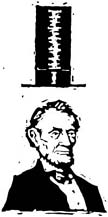|
Web Exclusives:On the Campus... January
24, 2001: by Alex Rawson '01 I suppose it was inevitable. But that doesn't mean I have to be happy about it. Try though I have to avoid using the dreaded "T" word in this space, I now find myself resigned to writing a column about the progress of my thesis. This strikes me as bizarre if for no other reason than that you, dear reader, have in all likelihood already written a thesis, and therefore probably care relatively little about my own travails. The truth, though, is that as the first semester begins to give way to the second, and as I realize exactly how much work I have to do, I find myself increasingly thinking about nothing else.
My thesis is on the memory of Abraham Lincoln among African-Americans from 1865 to 1968, and to write well on that topic requires as many primary sources as possible - the more sources, the more accurate the portrayal of trends in historical memory. My thesis adviser, on the other hand, because of unavoidable problems stemming from the size of the history department, specializes in the history of science and Tudor England, and as a consequence cannot help me find such sources. Not surprisingly, I have had some trouble finding a full enough range of source material, and that makes my research much more difficult. As much as I love the history department (which is quite a lot), in a smaller department I would almost certainly have had an adviser with significant knowledge of my own focus. The history department claims nearly 150 members of the class of 2001, making it by far the largest department this year. The advantage of such size is that I seldom have multiple precepts with the same students, as I might in a smaller department, and that means that I get a much broader range of views within departmental courses. On the other hand, since nearly two-thirds of history majors study American history while only one-third of the history faculty teach it, it is very difficult (as in my own case) to accurately match students with faculty for independent work. This must be as frustrating for faculty as it is for students - and there is certainly no simple solution to the problem. That said, at the moment I am quite pleased with my adviser - he has given me a number of crucial suggestions about my research process and the analytic structure of my paper (as well as less subtle advice such as his early December admonition, "The job search is important, but it is time to make the thesis a priority if you expect to do well." Oops. Point taken). In any case, it may turn out that because my adviser knows almost nothing about my topic we can avoid getting bogged down in the details of my particular reading of sources, focusing more productively on the broad issues of whether or not my historical approach is valid.
Thus, while I understand that I may not be able to have a thesis adviser who specializes in my area of interest, I wish there were a more established system in place for helping students in my position find sources. Such a system would be a reasonably simple patch to the problems faced by large departments, and would therefore be quite worthwhile. Maybe such a system already exists, in which case it just needs a bit more publicity. In the meantime, I had better get back to the library, because there are an awful lot of books in there, and I have barely begun to look at them!
|

 I
am a history major with an American Studies certificate, which means
that my independent work is disproportionately research-based. I
expect to spend the vast majority of my time simply poring through
primary sources. And this is where my problem comes in.
I
am a history major with an American Studies certificate, which means
that my independent work is disproportionately research-based. I
expect to spend the vast majority of my time simply poring through
primary sources. And this is where my problem comes in.  But
meanwhile, the problem of finding sources is nonetheless difficult,
especially since other members of the history faculty, absorbed
with helping their own advisees, simply (and quite understandably)
have less time available to help someone like me identify potential
sources. The truth is that I am too inexperienced in genuine historical
research to really know where to look.
But
meanwhile, the problem of finding sources is nonetheless difficult,
especially since other members of the history faculty, absorbed
with helping their own advisees, simply (and quite understandably)
have less time available to help someone like me identify potential
sources. The truth is that I am too inexperienced in genuine historical
research to really know where to look.